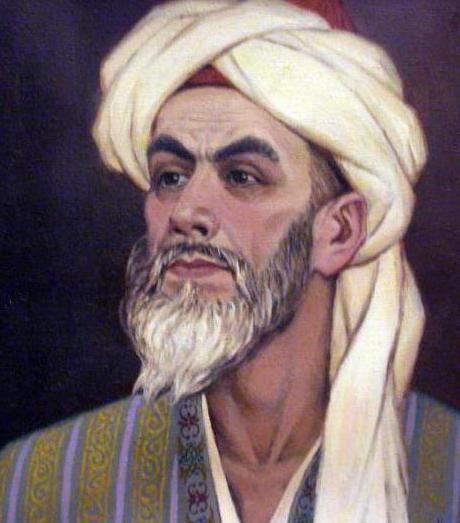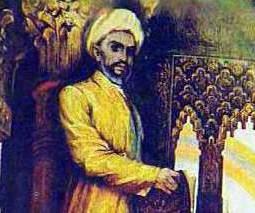Yusuf Balasaguni (years of life 1020 (approximately) - 1075) - a famous Turkic poet and thinker. This article will be devoted to his biography. What can we know about a man who lived in the eleventh century? Historians have literally bit by bit to collect information about him. About the early years of the thinker and poet, nothing is known at all. But in this article we will present all the information that researchers of the work of this philosopher have today.
Yusuf Balasaguni: a brief biography
The future philosopher, poet and encyclopedist was born in the time interval 1016-1020. in the city of Balasagun. Then it was the capital of the Karakhanid state. By the way, the city exists now on the territory of the modern Republic of Kyrgyzstan. But where exactly was Balasagun located? Scientists believe that this is modern Tokmok on the banks of the Chu, or it is located in the Zhambyl region, in the upper reaches of Aktoby. The capital of the Karakhanid state attracted artisans and intelligentsia from other regions of the Middle East. It is believed that the parents of Yusuf Balasaguni were wealthy people. Perhaps he came from a merchant estate. Be that as it may, Yusuf Balasaguni, whose biography, unfortunately, is full of white spots, received a brilliant education. He was fluent in Farsi and Arabic. Sources often call him Yusuf Khas Hadjib. This is not a surname, but a title. It means "minister of the court of the ruler." This honorary title was granted to the poet by the king of Kashgar when he presented him with the work of his life “Kutadgu bilig”. Balasguni died in 1074 or 1075. He was buried in Kashgar.

The Science of Happiness, or The Knowledge of Grace
Yusuf Balasaguni is known to have written many poetic works. Unfortunately, only one of his complete works has reached us. “Kutadgu Bilig” can be translated as “Knowledge of Grace” or “The Science of How to Be Happy.” The most complete manuscript of this poem is now stored in Uzbekistan, at the Institute of Oriental Studies at the Academy of Sciences. The poem “Knowledge of Grace” is divided into six thousand five hundred and twenty bates, and those, in turn, are divided into 85 chapters. The author wrote three more additions to his treatise, which contain three chapters and one hundred twenty-four bates. What kind of work is this - “Kutadgu Bilig”? Despite the fact that the work is in the form of a poem, it is distinguished by an ethical and moral orientation. Many researchers consider the "Science of Happiness" a philosophical treatise, since there we find numerous thoughts about the meaning and significance of human existence, about the relationship of the individual and society.

Turkic Machiavelli?
Do not forget that Yusuf Balasaguni wrote his work “Kutadgu Bilig” for the ruler of Kashgar. And this allows us to draw parallels with the treatise "Sovereign", authored by the thinker of the Italian Renaissance Niccolo Machiavelli. He devoted his work to the ruler and tyrant of Rome, Cesare Borgia. But, unlike Machiavelli, who teaches us how to join unions and break them, care more about our own political benefits than about the people, the work of Yusuf Balasaguni says something else. The medieval philosopher puts forward his demands on the ruler. He must be educated, versed in the sciences and art, strive for knowledge and justice, take care of his subjects. It can be said that the poem “Kutadgu Bilig” can rightfully be considered an important source for studying Turkic statehood.
Yusuf Balasaguni - Encyclopedist
“Knowledge of Grace” is not only a wonderful poem and political treatise. Many researchers of Yusuf Balasaguni's work call this work the first encyclopedia in the Turkic language. Indeed, the “Knowledge of Grace” contains a huge amount of all modern knowledge and ideas for the author in various fields of culture and science. This work summarizes the theoretical material of the concepts of a scientist from the eleventh century. The author is not shy to express his life position. We see in the work a philosophical understanding of worldview problems. This is the purpose of man, and the meaning of his life, place and role in nature and the public universe. We can say that in the encyclopedic work of Balasaguni “Kutadgu Bilig” an extensive system of knowledge is collected both of a philosophical nature and of an aesthetic and ethical plan. This work is a cultural section of that era.
Contribution to the literature
In addition to the encyclopedic nature of labor, it should be noted that the poem was written in the language of one of the Turkic peoples. On its pages we find brilliant examples of folklore of this ethnic group. The dialect in which Yusuf Balasaguni wrote his immortal poem “Kutadgu Bilig” became the basis, the core for creating the modern Uzbek language.
World fame
Even during the life of the author, his work “The Science of Happiness” was recognized. And not only the ruler of Kashgar. Balasaguni himself mentions this widespread recognition in a later appendix. The title Khas Hajib granted to him became his middle name. The author writes that in Iran his work is called “Shahnamei Türks” (that is, Turkic “Shahnameh”), and the inhabitants of the Arab East call the poem “Kutadgu Bilik” “Decoration of the rulers” (“Ziynat al-umara”). Researchers argue that this encyclopedic work had an undeniable influence on Turkic-speaking literature throughout the Middle Ages up to the XIV-XV centuries. Currently, the poem "Kutadgu Bilig" has been translated into several languages of the world. It can be read in both English and German. Yusuf Balasaguni himself, whose photo of the tomb can be seen even in travel magazines, has become the national hero of Kyrgyzstan. After all, he was born on this earth. For example, a portrait of a Uigur poet adorns a banknote of a local currency of one thousand soms.